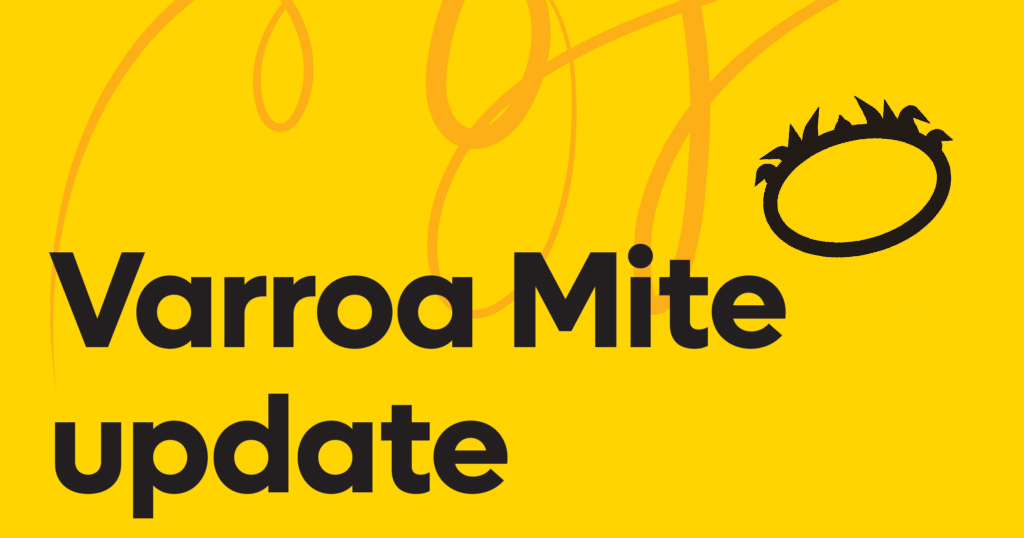AHBIC Industry Update 56 – 601 days of response
13 February 2024National Management Group The National Management Group met on Friday 9th February where the Varroa Response Transition to Management Plan was approved. The unanimous agreement being passed means activities can […]

National Management Group
The National Management Group met on Friday 9th February where the Varroa Response Transition to Management Plan was approved. The unanimous agreement being passed means activities can now formally commence, a positive outcome for industries and jurisdictions. AHBIC praises all attendees on getting the T2M plan over the line. The NMG lowered the agreed upper limit costs of the response to a maximum expenditure of $100 million dollars inclusive of T2M, of this cost-sharable amount the honey bee industry is responsible for 1.1%.
AHBIC successfully advocated for exceptional circumstances to be applied at NMG, allowing for an extension of timeframe beyond the usual 12 months to 24 months’ for T2M activities. AHBIC’s application to the NMG was successful resulting in an historic achievement. A big win for our national honey bee industry. This extension will allow critical activities like extension across all jurisdictions to continue over a longer period. This will ensure all beekeepers have the opportunity access the resources as needed.
The T2M plan
Building industry resilience and capacity
Education:
A significant portion of the T2M will focus on education. The development of national education materials and rollout of non-accredited workshop training will commence for a period of 12 months. This will include face to face training events across all jurisdictions for all beekeepers, online learning, webinars, factsheets and video resources.
Extension and Engagement:
Varroa Development Officers will be employed in each of the jurisdictions to assist beekeepers in Varroa mite management and/or planning through hands on engagement with beekeepers. These new roles will focus on engaging practically with beekeepers around hive health monitoring, extension of best management practice guidelines, presentations and engagement at club and association branches and to also promote other T2M activities such as implementation of the COLOSS survey in Australia.
A Pollination Industry Coordinator will also form part of T2M activities to assist with additional extension and engagement activities specifically for the pollination-dependent industries and their key industry contacts. This will be a great conduit for our industry to work more closely with our pollination-dependent colleagues.
Biosecurity Code of Practice, BOLT Course and Biosecurity Manual for Beekeepers Updates:
The Code, BOLT and the Manual provide a framework for Australian beekeepers to use best practice biosecurity measures and is legislated in some jurisdictions. Each of these national documents are based on the principles of good biosecurity and describe the outcomes a beekeeper needs to achieve for good pest and disease prevention and control. All updates will need to reflect Varroa’s presence in Australia.
Establish an Australian COLOSS survey:
Establishment of an Australian COLOSS survey will assist in helping understand the effects of Varroa mite on beekeeping in Australia. Participating in this global initiative of standardised colony loss survey will help industry drive future research priorities, treatment recommendations and practice changes. AHBIC will oversee this activity with extension provided through the Varroa Development Officers nationally.
Australian Queen Bee Sector Analysis & Advanced Queen Breeding Training Workshops:
Both important activities for industry, the first being assessing existing industry capability and capacity and determining a clear strategy and pathway to achieving Varroa resistant stock. Secondly, workshops on advanced queen breeding will be delivered across key regional areas to further develop experienced queen producers with knowledge, techniques and resources to advance this important industry sector.
Additional funding for industry focused activities
- Investigation of a National Varroa Mite Data Management Platform
- National diagnostics enhancement
- Facilitation of Varroa control products
The NSW DPI are working to provide a publicly available version of the T2M plan and this will be made available in the coming weeks.
Surveillance/Monitoring
Mandatory hive monitoring and reporting for varroa every 16 weeks remains in place across all of NSW. For all beekeepers, regularly monitoring hives, at minimum every 16 weeks, for presence of varroa through alcohol/soapy water washing/sugar rolling and reporting results can impact on timely management choices and reduce the impacts of varroa across the landscape.
To learn more about alcohol washing check out the nationally agreed resource Bee Pest Blitz: https://www.planthealthaustralia.com.au/beepestblitz/
You can reach out to AHBIC via:
Varroa Coordinator
Bianca Giggins
0402 467 780
AHBIC, its employees, executive and consultants expressly disclaim all and any liability to any person in respect of anything, and the consequences of anything, done or omitted to be done in reliance, whether wholly, partly, upon the whole or any part of the contents of this industry update document.
